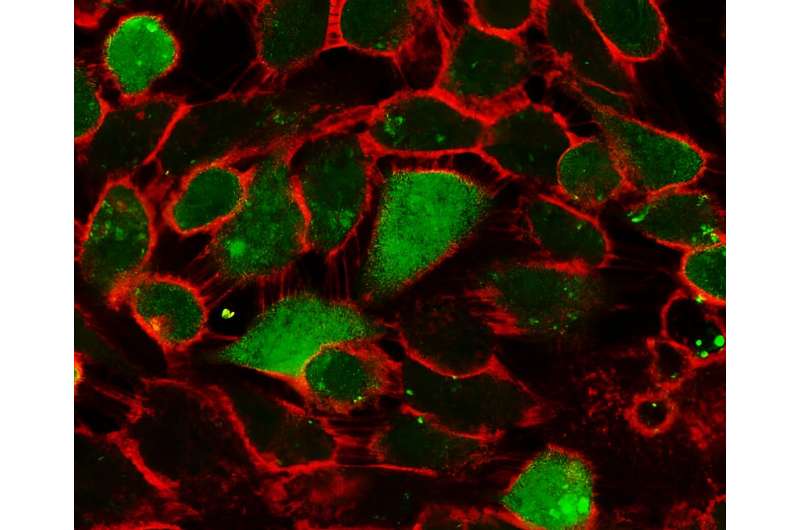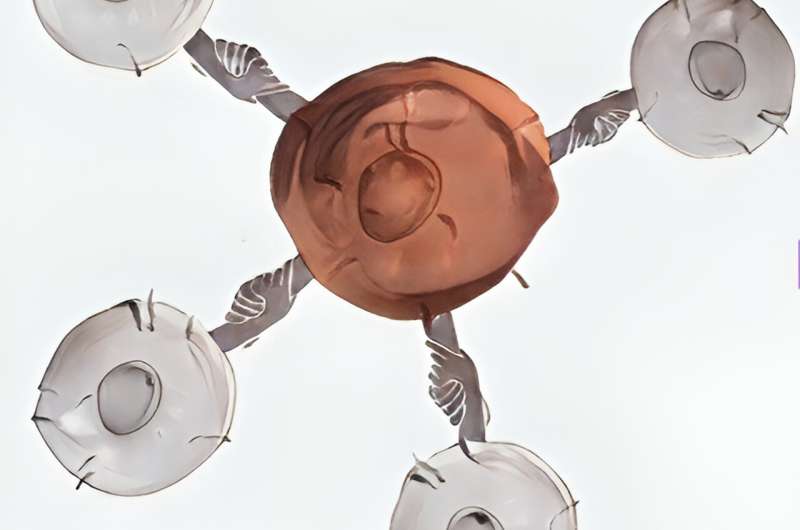
For patients with early-stage breast cancer, there is a 7% to 11% chance of relapse within five years after receiving initial treatment, and this rate can be higher for patients with more advanced stages of the cancer. While chemotherapy aims to eliminate all cancer cells, some of them may evade treatment and survive, resulting in the recurrence of the cancer.
In a study that spanned over ten years, Research Assistant Professor Leong Sai Mun from the NUS Centre for Cancer Research (N2CR) and the Department of Pathology at the Yong Loo Lin School of Medicine, National University of Singapore (NUS Medicine) and his research team sought to uncover the reasons for why some breast cancer tumors survive chemotherapy.
In examining tumor and blood samples from 63 patients with breast cancer across different stages, as well as lab-grown breast cancer cells and laboratory models, the team found that cancer cells with high expression of a certain molecule—a small non-coding RNA known as miR-125b—cooperate with surrounding cancer cells to allow the latter to grow and resist chemotherapy.
Contrary to the widely held belief that cancer cells are solely self-serving and driven by their own survival, this breakthrough study confirms that they display altruistic behavior to help other cancer cells thrive by sacrificing their own abilities to multiply. This discovery reveals that disrupting such cooperation could be key to developing more effective treatments for breast cancer.
Asst Prof. Leong said, "Our research has identified these cooperative behaviors between cancer cells, which treatment must target specifically, for them to be destroyed more effectively. For example, treatment methods have to incorporate mechanisms that prevent the surrounding cancer cells from responding and benefitting from the 'self-sacrificing' cells."
Published in Molecular Cancer, the research paper describes the complex signaling process within these altruistic cells which results in the tumor's overall resistance to treatment.
Through a signaling pathway known as NF-κB, altruistic cancer cells showing high miR-125b expression undergo reduced proliferation. Paradoxically, this same signaling process prompts these altruistic cancer cells to release substance—proteins known as IGFBP2 and CCL28—which fosters greater tolerance to chemotherapy across the entire cancer tumor.

"Removing these altruistic cancer cells can be a potential treatment strategy. However, we may have to consider the persistence of these cells. We found that despite the self-sacrifice, the altruistic cancer cells can regenerate from the non-altruistic ones and remain within the tumor population at a low yet consistent frequency," added Dr. Muhammad Sufyan Bin Masroni, first author of the study, and research fellow from the Department of Pathology at NUS Medicine.
The research team also involved collaborators from other departments of NUS Medicine; the NUS Faculty of Science; National University Hospital (NUH); Nanyang Technological University, Singapore (NTU); Singapore Institute for Clinical Sciences (SICS) and Institute of Molecular and Cell Biology (IMCB) at the Agency for Science, Technology and Research (A*STAR); MiRXES; CellSievo; Raffles Hospital; Tucker Medical; and the Pennsylvania State University, United States.
Associate Professor Mikael Hartman, Head and Senior Consultant, Division of General Surgery (Breast Surgery), Department of Surgery, NUH, and co-author of the study, said, "This research study provides important insights into the intricate biology of breast cancer, offering a promising avenue for better comprehension of its behavioral aspects, prognosis, and potential treatment targets."
Through the study, the team demonstrated complex interactions among cancer cells, which resemble social bonds observed in micro-organisms and animals, such as bees and ants. The team also showed that certain cancer pathways, which are currently recognized as separate mechanisms that either suppress or grow tumors, can take place as simultaneous events within the altruistic cancer cells, regulating the delicate balance of cooperative social behavior within the tumor.
Beyond cancer treatment, the fundamental mechanism of such altruistic behavior has broader implications for the understanding of the interplay between social organisms in other diseases, such as those driven by bacteria or viruses.
More information: Muhammad Sufyan Bin Masroni et al, Dynamic altruistic cooperation within breast tumors, Molecular Cancer (2023). DOI: 10.1186/s12943-023-01896-7
Citation: Breast cancer cells' self-sacrificial behavior uncovered as potential cause of relapse (2023, December 29) retrieved 30 December 2023 from https://ift.tt/WSoJIDs
This document is subject to copyright. Apart from any fair dealing for the purpose of private study or research, no part may be reproduced without the written permission. The content is provided for information purposes only.
"behavior" - Google News
December 29, 2023 at 11:59PM
https://ift.tt/f2NrmRQ
Breast cancer cells' self-sacrificial behavior uncovered as potential cause of relapse - Medical Xpress
"behavior" - Google News
https://ift.tt/OliAw85
Bagikan Berita Ini














0 Response to "Breast cancer cells' self-sacrificial behavior uncovered as potential cause of relapse - Medical Xpress"
Post a Comment